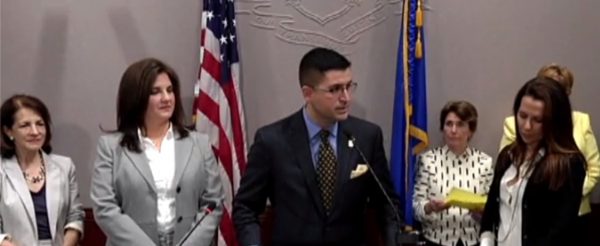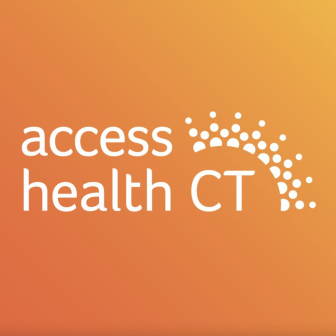Play with Purpose at Two Connecticut Pre-Schools
/Local school systems in Enfield and Manchester implemented a purposeful play initiative, with support from LEGO Community Fund US and the Hartford Foundation for Public Giving. The results of the initiative are highlighted in a new video, which emphasizes that there’s more to play than may be apparent at first glance. Program organizers point out that “young children are naturally curious and full of life. Provided a supportive environment, they will joyfully splash, build and smash, pretend, sing, and dance.” While they are having a ton of fun, they are also making sense of the world and learning through exploration, experimentation and social interaction.
Program organizers point out that “young children are naturally curious and full of life. Provided a supportive environment, they will joyfully splash, build and smash, pretend, sing, and dance.” While they are having a ton of fun, they are also making sense of the world and learning through exploration, experimentation and social interaction.
The LEGO Community Fund US has long asserted that learning through play enables children to become creative and engaged lifelong learners. In 2014, they put forward a proposal and funding to develop and test new materials to advance facilitated play in children’s homes, preschool and kindergarten. The idea is that a young child’s parents and teachers should really be facilitators of intentional play experiences.
The Hartford Foundation matched LEGO’s grant, and the Connecticut Office of Early Childhood participated with in-kind funds to create a training video, making the initiative a cross-sector effort. Laura Post, Vice President of Consumer Insights, LEGO Group, said of the collaboration, “We shared, as organizations, a passion for early childhood.” The pilot was run in Manchester and Enfield, home of LEGO’s U.S. headquarters.
The collaborative, 17-month initiative ran from January 2015 through May 2016. During that time, participating parents and educators learned how facilitated play can support children’s cognitive, social and emotional development. Emphasis was placed on how to teach young children, not what to teach them. The goal was to incorporate life and academic skills in a way that is fun for young children.
The Supporting Educational Success through Playful Learning workshops, that Enfield held in English and Spanish, were a catalyst for the development of a community campaign on the importance of play.
Schools Superintendent Dr. Jeff Shumann said the program sets students up for success in the future. “It gives them those interpersonal skills, creative thinking skills, the problem solving skills, and certainly the communication skills that will help them enhance their learning as they get into deeper and more rigorous academics in the coming years.”
Kindergarten and pre-K teachers are receiving coaching to integrate purposeful play into all curriculum areas. Early educators participated in a series of play based workshops, and families attended play events, gaining an understanding of the value of play.
 Manchester’s Supervisor of Student Development, Karen Gray, says it became “obvious how developmentally appropriate it is for children to play, and to have fun, and to smile and to laugh.” As they did, teachers would “see them develop cognitively," although "they are not necessarily aware of the skills that they are actually developing.”
Manchester’s Supervisor of Student Development, Karen Gray, says it became “obvious how developmentally appropriate it is for children to play, and to have fun, and to smile and to laugh.” As they did, teachers would “see them develop cognitively," although "they are not necessarily aware of the skills that they are actually developing.”
Adds Latasha Easterling-Turnquest, District Director of Manchester Public Schools’ Family Resource Centers, “Given the opportunity, a child, through play, can show you what he or she can really do.”
PHOTOS: Jeff Shumann, Karen Gray.
https://youtu.be/y20-G6AnIV0


 The index publication is supported by the Anthem Blue Cross and Blue Shield Foundation. It is a scientific snapshot of the health and fitness status at a metropolitan level using data made up of personal health, community and environmental factors.
The index publication is supported by the Anthem Blue Cross and Blue Shield Foundation. It is a scientific snapshot of the health and fitness status at a metropolitan level using data made up of personal health, community and environmental factors.
 The region’s personal health rank was 13; its community/environmental indicators rank was 25, leading to an overall ranking of 13th. The analysis points to “Areas of Excellence,” in the region, including:
The region’s personal health rank was 13; its community/environmental indicators rank was 25, leading to an overall ranking of 13th. The analysis points to “Areas of Excellence,” in the region, including:

 Venture capital firms are typically deep-pocketed, small companies that bet on startup success by investing millions in exchange for an ownership interest and hopes of high returns. Published
Venture capital firms are typically deep-pocketed, small companies that bet on startup success by investing millions in exchange for an ownership interest and hopes of high returns. Published 


 ess to the issue of childhood drownings. Steven Hernández,, Executive Director of the Commission on Women,
ess to the issue of childhood drownings. Steven Hernández,, Executive Director of the Commission on Women,  The statistics about children’s drowning deaths have not changed over time, implying that current strategies for prevention are not enough, officials said. Increasing children’s access to swim lessons, encouraging schools to teach water safety skills to students and giving parents easy-to-use and engaging tools to talk to their children about how to be safe around water are just a few actions that can have a big effect in reducing drowning rates, officials stressed.
The statistics about children’s drowning deaths have not changed over time, implying that current strategies for prevention are not enough, officials said. Increasing children’s access to swim lessons, encouraging schools to teach water safety skills to students and giving parents easy-to-use and engaging tools to talk to their children about how to be safe around water are just a few actions that can have a big effect in reducing drowning rates, officials stressed.

 Nearly two-thirds of those surveyed in Connecticut (64%) called for “using technology to enhance the way students learn in the classroom” – the highest percentage among the six New England states. A majority called for “more significant efforts to close achievement gaps” (59%), more effective teachers (62%) and changes to the ways schools are funded (57%). The state legislature in Connecticut is currently considering changes in the school funding formula proposed by Gov. Malloy in the wake of a state court decision.
Nearly two-thirds of those surveyed in Connecticut (64%) called for “using technology to enhance the way students learn in the classroom” – the highest percentage among the six New England states. A majority called for “more significant efforts to close achievement gaps” (59%), more effective teachers (62%) and changes to the ways schools are funded (57%). The state legislature in Connecticut is currently considering changes in the school funding formula proposed by Gov. Malloy in the wake of a state court decision.



 Connecticut’s best ranked Congressional district is the 2nd, in Eastern Connecticut, with an 8.7 percent of youth ages 16-24 disconnected, ranking 60th among the nation’s 435 Congressional districts. Next best if Connecticut’s 5th district, in Western Connecticut, ranked 116th with 9.9 percent disconnected youth. The 3rd C.D. ranks 134th, at 10.1 percent; the 4th C.D ranks 104th with 10.3 percent; and the 1st C.D. ranks 167th at 10.9 percent.
Connecticut’s best ranked Congressional district is the 2nd, in Eastern Connecticut, with an 8.7 percent of youth ages 16-24 disconnected, ranking 60th among the nation’s 435 Congressional districts. Next best if Connecticut’s 5th district, in Western Connecticut, ranked 116th with 9.9 percent disconnected youth. The 3rd C.D. ranks 134th, at 10.1 percent; the 4th C.D ranks 104th with 10.3 percent; and the 1st C.D. ranks 167th at 10.9 percent.





























